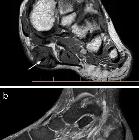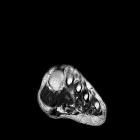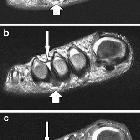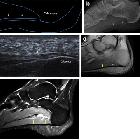plantar fibromatosis














Plantar fibromatosis (plural: fibromatoses), also known as Ledderhose disease, refers to a benign fibroblastic proliferation of the plantar fascia. It is classified as a type of musculoskeletal fibromatosis.
Epidemiology
Plantar fibromatosis can be seen in both children and adults, although there is a recognized male predilection (M: F of 2:1).
Clinical presentation
Nodules or masses of plantar fibromatosis are typically located in the middle to the medial aspect of the plantar arch and may extend to involve the skin or deep structures of the foot. Lesions may be symptomatic because of a mass effect or invasion of adjacent muscles or neurovascular structures. In contrast to Dupuytren disease, flexion deformities usually do not occur .
Plantar fibromatosis is associated with other fibroproliferative disorders such as:
- Dupuytren disease (also known as palmar fibromatosis) is seen in ~40% (range 10-65%) of patients
- keloids
- Peyronie disease
Pathology
Unfortunately, the exact etiology of plantar fibromatosis is not well understood .
Radiographic features
Ultrasound
Often seen as a hypo to mixed echogenicity , discrete, fusiform, multinodular thickening of the plantar fascia located separately to the calcaneal insertion . Most (~90%) do not demonstrate intrinsic vascularity on Doppler ultrasound .
MRI
Typically relatively well-defined region of fusiform or multinodular thickening of the plantar fascia, not involving the calcaneal origin
Signal characteristics
- T1: iso to low signal compared with muscle
- T1 C+ (Gd): demonstrates variable contrast enhancement
- T2: low to intermediate signal compared with muscle
Treatment and prognosis
Initially, orthotics and local steroid injection are the treatment of choice. Radiotherapy is the most efficient with the least recurrence rate . Local excision with a wide margin is the definitive treatment for painful or disabling lesions, but recurrences are common .
Differential diagnosis
Possible considerations include
- soft tissue sarcoma
- in some cases, it might be difficult to differentiate
- typically sarcomas are aggressive and demonstrate low signal on T1WI and high signal on T2WI with intense and sometimes heterogeneous contrast enhancement
- plantar fasciitis (especially if nodular): affects the proximal aspect with fusiform thickening of the fascia
History and etymology
Plantar fibromatosis is sometimes referred to as Ledderhose disease after Georg Ledderhose (1855-1925), German surgeon, who first described it in 1894 .
Siehe auch:
- Morton-Neuralgie
- Morbus Dupuytren
- Induratio penis plastica
- Plantaraponeurose
- Plantarvenenthrombose
- Plantarfasziitis
- Fibromatose
- muskuloskelettale Fibromatose
und weiter:

 Assoziationen und Differentialdiagnosen zu Morbus Ledderhose:
Assoziationen und Differentialdiagnosen zu Morbus Ledderhose:






